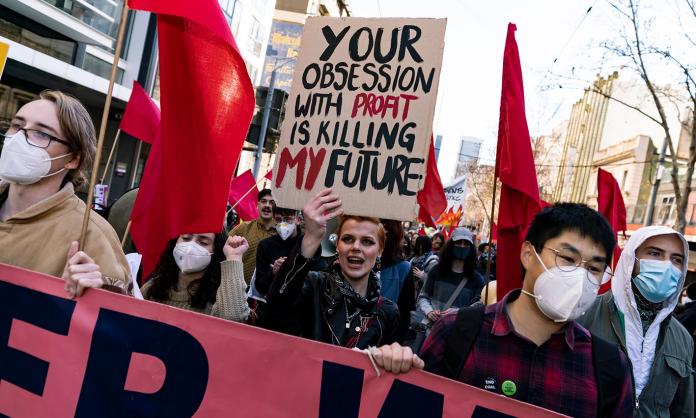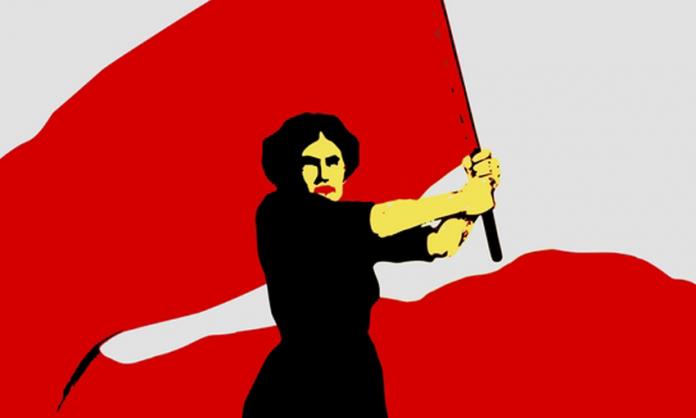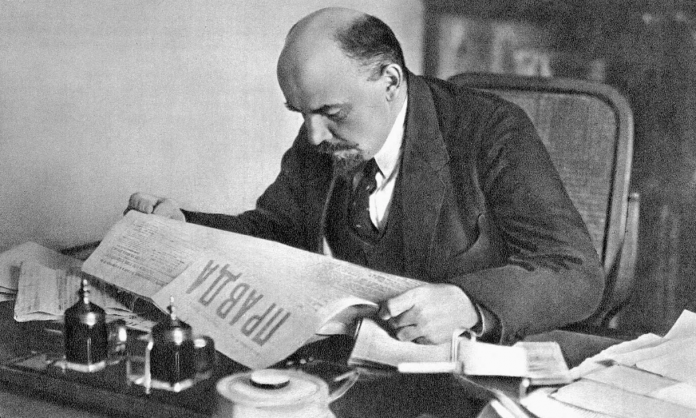Last year, amid climate catastrophe, COVID-19 and economic turmoil, Collins Dictionary named “permacrisis” its word of the year. The term “polycrisis” has also become a buzzword in establishment circles. You don’t have to be a socialist to recognise that capitalism isn’t doing well.
And it’s not only socialists who seem to want to try to tackle these problems. Virtually everywhere you turn, you’ll find talking heads, think tanks, NGOs and global forums ostensibly dedicated to creating social change. Typical is the annual World Economic Forum at the Swiss alpine resort town of Davos, where billionaires, political leaders and “visionaries” discuss everything from tackling food insecurity to upholding civil liberties and human rights.
The discussions are most often worse than useless. At Davos this year, the leaders of a global economy in which the richest 1 percent own half the world’s wealth mouthed meaningless platitudes about “system-positive change”, “vision-driven policies” and “a growing need for a new global system that is more stakeholder based”. But none of the solutions offered in mainstream political discussion can solve anything because they’re all based on an acceptance and defence of capitalism.
Socialism offers something different. Socialism can not only identify the problems the world faces, but also provide real alternatives, because it starts with what other explanations of change don’t—an analysis of the social structures that produce inequality, oppression and crisis.
Capitalism is a system in which private profit-making determines how resources are used. Goods and services are produced only insofar as profits can be made for companies, and are supplied only when the right price will be paid. This is not the result of human nature, but of a small minority of people owning and controlling the factories, arable land, mines, transport networks and power stations. Members of that minority are in constant competition with each other to increase their profits and gain access to ever-widening markets. The search for greater profits underpins the decisions about how resources will be allocated. And those with economic power are unelected and largely unaccountable.
Socialism proposes a rational alternative: a society in which production and distribution are organised democratically to satisfy human need—a society that is run by the majority of people who do all the work, rather than the minority who live off the rest of us. Crucially, socialism isn’t just a nice theory—it’s a movement that has organised hundreds of millions of workers, and poor and oppressed people, over the last 150 years to challenge injustice and fight for a better world.
It’s a movement that has the answers to the crises of the 21st century.
Climate change
There is overwhelming evidence that an immediate shutdown of the fossil fuel industry is necessary to avoid catastrophic warming and the destabilisation of entire ecosystems. Yet coal, gas and oil are experiencing an unprecedented boom. At a time when fossil fuel companies should be pariahs, Shell has posted profits of more than US$40 billion, its highest in 115 years. Shell isn’t alone. A recent report from the COP27 climate summit found that 96 percent of energy companies are planning to expand their exploitation of fossil fuels.
While the big corporations push us past points of no return, we are encouraged to take individual action to reduce emissions: eat less red meat, buy a keep cup, take fewer overseas trips. This “make change with every purchase” approach is a cynical attempt to distort the source of most greenhouse gas emissions. A 2017 report from the Carbon Disclosure Project found that 100 companies have produced about 71 percent of all global emissions since 1988. The term “carbon footprint”, ubiquitous today in discussions about changing your lifestyle to mitigate climate change, was coined by the fossil fuel giant BP to encourage people to look inwards, instead of identifying the criminals responsible for destroying the planet.
Emissions targets for 2050, pledged by governments across the world, seem like a more serious response to the climate crisis. But they are just another strategy to buy more time for the expansion of fossil fuels. The bulk of the work is supposed to be done via technologies that will offset emissions, such as carbon capture and storage—technologies that have never been proven to work effectively.
The socialist solution to the climate crisis would be as simple as it would be effective: expropriate the wealth of fossil fuel companies and use it to transition to renewable energy sources. The International Monetary Fund estimates that US$5.9 trillion was spent subsidising fossil fuel companies in 2020. This amount could have funded enough wind farms and solar panels to supply most of the world’s energy needs. Production facilities could be built in a matter of months if the political will existed. But this would require a complete revolution in the way that we live—not just a technological revolution, but an overturning of our entire political system.
Inequality and exploitation
According to Oxfam International’s 2022 report “Inequality kills”, the world’s ten richest men more than doubled their fortunes to $1.9 trillion during the first two years of the pandemic, while more than 160 million extra people were forced into poverty. There is general agreement that rising inequality has something to do with government policy over the past few decades. Everyone from the head of the International Monetary Fund to Anthony Albanese can agree on this. But inequality is about more than bad policy—it’s a product of the exploitation and class division at the heart of capitalism.
Under capitalism, workers are never paid the full value created by their labour. People work eight- or ten-hour days but get paid the equivalent of what they create in three or four hours—the rest is pocketed by the capitalist class. This legalised theft, which socialists call “exploitation”, is what allows CEOs like Jeff Bezos and Elon Musk to amass such obscene fortunes. If an individual worker objects to this unfair arrangement, they are free to find employment with another exploiting boss, or join the Centrelink queue. There’s no escape from exploitation so long as we have capitalism.
How much workers can challenge exploitation depends on their ability to organise collectively. Because labour is the source of all the bosses’ profits, workers can fight for a better deal by withholding their labour—going on strike—and bringing their workplaces to a halt and preventing the capitalists from making any profits. This is what socialists mean when we talk about “class struggle”.
From the 1960s to the early 1980s, inequality in Australia fell, mainly because workers were fighting for higher wages and better working conditions. Between 1964 and 1974, the strike rate soared; so too did the wages share of national income. Workers also gained important reforms like Medicare.
But class struggle goes both ways under capitalism. Bosses are always looking for ways to undermine and undo gains achieved through workers’ struggles. This is what has happened since the 1980s in Australia: as strike rates have collapsed, hard-won reforms have been undone and inequality has skyrocketed.
Socialism is not just about making life a bit better. Socialists want to take workers’ struggle to its logical conclusion, by ending the division between those who give orders and those who work—by ending exploitation altogether.
Oppression
Racism, sexism and other forms of social inequality are necessary in a society in which a minority rule over the majority. The capitalist class needs to find ways to channel the mass of oppressed people’s discontent towards one another rather than towards the powerful.
Sections of the working class that are distinctive or somehow vulnerable—whether recently arrived migrants, women, international students or young workers—often face discrimination, receive lower pay and can find only undesirable jobs. The capitalist class is the only group that benefits from this arrangement.
The most commonly proffered solution to oppression is to make the rulers of our system more diverse. The argument is that if there were more non-white heads of state or more women serving on corporate boards, the interests and needs of the oppressed and marginalised would be considered when decisions are made. In reality, “diversification” at the top has simply resulted in a small layer of “representatives” of oppressed groups joining the ruling class and identifying with (and benefiting from) the system that oppresses the majority.
The Black Lives Matter movement in the United States erupted under the country’s first Black president: the promise of a “post-racial” society that Barack Obama’s election was supposed to represent patently failed to materialise. When Gail Kelly in 2008 became the first female CEO of a major Australian bank, Westpac, she did nothing to challenge the gender pay gap in the financial services industry. And why would she? Giving women workers at Westpac a pay rise would have cut into company earnings and probably reduced her own bonuses.
The socialist movement has always recognised that fighting oppression is both an immediate and a long-term task. To eliminate social oppression, the capitalist system needs to be destroyed. But for workers to unite against the system and build a movement capable of challenging it, socialists need to tackle divisive ideas and champion the oppressed in the here and now. This is why socialists have always been at the forefront of battles for equality, from Australian communists championing Indigenous rights in the 1920s to socialist trade unionists fighting for equal pay in the 1960s.
Many sincere fighters against oppression who began as “moderates” have come through their experience to see the need for socialist politics. For example, Martin Luther King concluded, after his years-long participation in and leadership of the civil rights movement, that moral persuasion would not be sufficient to win equality.
“We must recognize that we can’t solve our problem now until there is a radical redistribution of economic and political power”, he told Southern Christian Leadership Conference staff in 1967. “We must see now that the evils of racism, economic exploitation and militarism are all tied together ... you can’t really get rid of one without getting rid of the others ... the whole structure of American life must be changed.”
A socialist society, geared towards meeting people’s needs under democratic control, would have no need for unequal pay, Indigenous land theft, religious persecution, sexist objectification, gender binaries and police violence.
The creation of a rational society will require revolutionary transformation. The capitalist class and its institutions will need to be defeated and dismantled by the mass, coordinated power of the popular majority. This is no small task.
Confronting this reality is a cause for optimism. Socialist politics can help you to understand how the problems facing the world aren’t natural or inevitable, but a product of the specific, class-divided capitalist society that we live in. Humans created capitalism; we can unmake it, too. A completely different world is possible.










